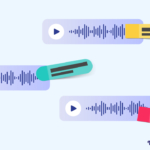Your Audience Doesn’t Want More. They Want Better.
Some podcasters believe publishing more episodes over a short period drives up their download numbers. Others record and publish constantly, to “beat the algorithm.” However, volume isn’t a strategy for audience engagement.
When you want to cultivate an audience that cares about your podcast’s topic and supports your show, you don’t need to produce tons of content. You need to produce relevant ideas, present them skillfully, and publish on a habit-forming schedule. Let me show you why podcasters should prioritize consistency and quality over quantity to foster stronger connections with their audience.
Podcast Listeners Care About Consistency and Quality.
When your podcast is well-crafted and you publish on a regular schedule, your show becomes a habit for your audience. If your audience knows that your latest podcast episode is worth their time and attention, and when to expect it, they’re more likely to engage.
Many times at my old data entry job, I’d start the day feeling gloomy, remember, “It’s Tuesday! New episode of The Bugle!” and brighten up.
When podcasters give their audience something to look forward to, that builds trust and keeps people coming back.
Too Much Content Adds Noise Rather Than Value.
Extras like clips, shorts, behind-the-scenes, or minisodes can overwhelm feeds and dilute the main show’s impact. Yes, bonus content can be a valuable promotional tool. But if your feed consists of episodes with varying lengths, moods, and formats, new audiences may struggle to grasp what your podcast is really like. And, if your existing audience doesn’t know what to look forward to, they’ll take their attention elsewhere.
But, when you prioritize quality over quantity, your audience is more likely to share episodes with their friends. To reward your audience’s trust, rely on the format and style they expect.
Time Is Scarce; Curation Beats Volume.
Living in the 21st century means that something constantly wants to capture your attention. People are overwhelmed by a constant barrage of information wherever they go. Even garbage cans have advertising. Between work, family, social life, and sleep, it’s no wonder people feel overwhelmed.
When people are busy and tired, a notification popping up on the nearest screen telling them to check out this video or listen to a clip isn’t fun. It’s a mosquito buzzing in your ear. Even your fans want you to prioritize quality over quantity: publishing numerous episodes constantly makes the novelty wear off.
Your audience doesn’t want more from you. They want what matters: a focused, engaging episode worth their time. And when your audio is clear, your ideas are structured and interesting, and your publishing schedule is predictable, they’re willing to wait for you to publish the next episode.
Quality Podcasts Are Worth the Wait.
I don’t remember where I read this story, but it’s stuck with me for years.
Once, a monk invited a wealthy and powerful man to eat lunch with him. The monk worked in the kitchen as diligently as if he were preparing a sumptuous feast for a hundred guests. Meanwhile, the guest, used to getting his way, grew impatient. As his hunger grew, the guest shouted that he was starving and couldn’t wait a moment longer. The monk called out that the meal would be ready soon. Finally, after a very long wait, the monk came out carrying two steaming bowls of miso soup. He served his guest and sat down to eat.
The hungry guest spooned some of the warm, fragrant broth into his mouth. “This is the finest broth I’ve ever tasted!” he said. “What kind of soup is this?”
The monk said, “It’s just miso soup.”
Every time I have to wait patiently for anything, I think “miso soup theory,” remembering that waiting makes something good seem better.
When you load your feed with “content” for the sake of volume, that extra “stuff” clutters your brand and reputation. But when you prioritize quality over quantity and publish on a predictable schedule, your audience will come back for more.
Much of what makes podcasting effective lies in social skills instead of technical processes. In our Indiepod Community, we discuss a wide range of topics, including building empathy and trust over time. To find out more, join our free community and introduce yourself!

